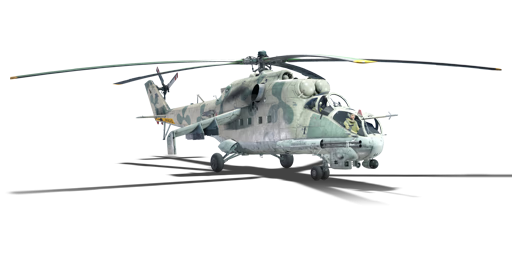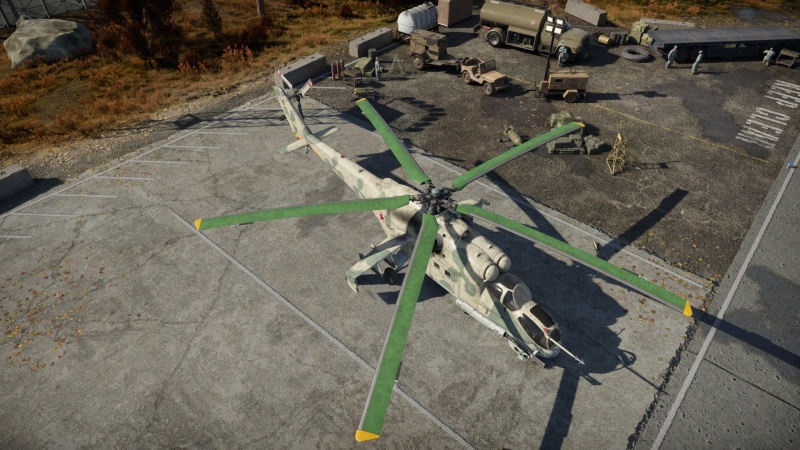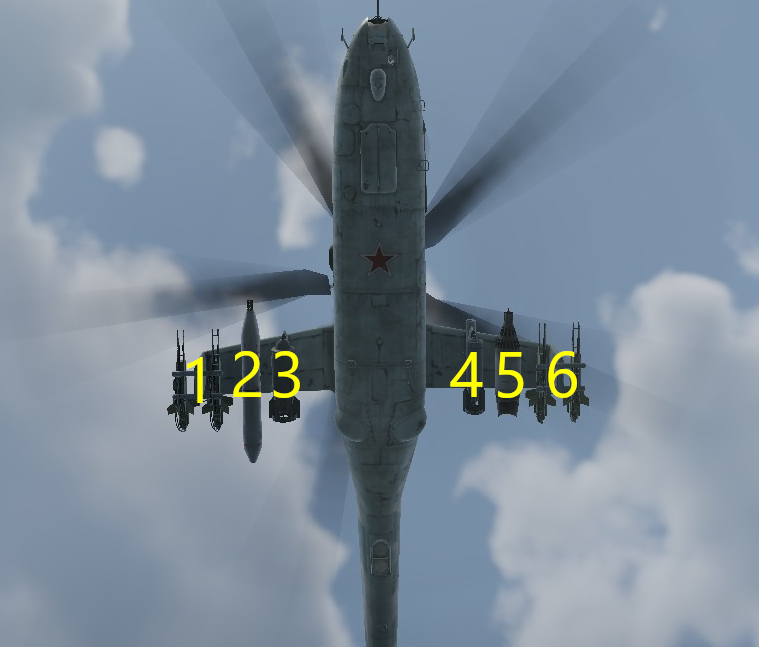Mi-24P
| This page is about the Soviet attack helicopter Mi-24P. For other versions, see Mi-24 (Family). |
Contents
Description
In 1981, a dedicated anti-tank variant of the Mi-24V was devised, replacing the gunner-controlled, nose-mounted 12.7 mm turret with a pilot-controlled fixed Gsh-30-2K twin-barrel 30 mm cannon from an Su-25 for anti-tank duties. The resulting variant, named the Mi-24P, would quickly enter service, and would also be exported alongside the Mi-24V to many countries.
The Mi-24P (NATO reporting name: Hind-F) was introduced in Update 1.81 "The Valkyries". The Mi-24P is very similar to the previous Mi-24V, having the same airframe, technology, and weapons. The only difference is the gun armament: the chin-mounted 12.7 mm Gatling gun has been replaced with a fixed GSh-30-2K cannon mounted on the right side of the nose for anti-armour duties. This is the same type of cannon mounted on the Su-25 attack jet, another Soviet "flying tank". Although it is difficult to aim, a quick burst from the cannon can shred lightly armoured vehicles. Thus, the Mi-24P is a sidegrade to the previous Mi-24V, being more focused on anti-armour duties than anti-infantry.
General info
Flight performance
| Characteristics | Max Speed (km/h at 1,000 m) |
Max altitude (metres) | |
|---|---|---|---|
| AB | RB | ||
| Stock | 310 | 292 | 4950 |
| Upgraded | 359 | 335 | |
Survivability and armour
The Mi-24P Hind is protected by 4 mm steel plates near the cockpit area, and the engine area, giving it decent protection against small MG fire, and shrapnel. The cockpit is protected by 60 mm of bulletproof glass, though it's only on the front and the pilot can be knocked out easily with a spray of MG fire. Same can be applied to the gunner too. It can survive direct shots, especially if the enemy hits the crew compartment due to the empty space of that area, though there is fuel underneath the crew compartment and can be set on fire if it is hit. HE/HE-VT, ATGMs, SAMS and AAMs are usually detrimental to the Hind and can bring it down easily, though MANPADs such as Stingers and Iglas can be tanked as they have lower explosive power, but they can render the Hind critically damaged/disabled and needing to return to base.
Modifications and economy
Armaments
| Ballistic Computer | ||
|---|---|---|
| CCIP (Guns) | CCIP (Rockets) | CCIP (Bombs) |
| |
|
|
Offensive armament
The Mi-24P is armed with:
- A choice between four presets:
- 1 x 30 mm GSh-30-2K cannon (250 rpg)
- 1 x 30 mm GSh-30-2K cannon (250 rpg) + HIRSS
- 1 x 30 mm GSh-30-2K cannon (250 rpg) + HIRSS + 192 x countermeasures
- 1 x 30 mm GSh-30-2K cannon (250 rpg) + HIRSS + 192 x countermeasures + IRCM
The fearsome dual-barrel GSh-30-2K cannon boasts a high muzzle velocity, a rapid 2,600 rounds/min rate of fire, and a powerful mix of shells that are effective against both aircraft and ground vehicles. Compared to the Su-25 Grach's basic GSh-30-2, the Mi-24P's "K" variant has a longer barrel (by nearly 1 metre) and thus improved muzzle velocity and penetration. It does not have enough punch to be a major threat to MBTs, other than those with particularly poor side armour, but it is a quick way to mop up IFVs and SPAAs that are within gun range and not paying attention. Be mindful of the limited ammunition supply and use the ballistic computer to aim precisely.
Although the GSh-30-2K is powerful, its fixed mount makes it difficult to aim. The Mi-24P needs to point its nose directly at the target for the duration of a burst and the airframe does not have the nose authority or general agility to make this easy. In air-to-air combat, these disadvantages are magnified, and the previous Mi-24V's Yak-B gun may be more practical.
Suspended armament
The Mi-24P can be outfitted with the following ordnance:
| 1 | 2 | 3 | 4 | 5 | 6 | ||
|---|---|---|---|---|---|---|---|
| 23 mm GSh-23L cannons (250 rpg) | 1 | 1 | 1 | 1 | |||
| 250 kg OFAB-250sv bombs | 1 | 1 | 1 | 1 | |||
| 500 kg FAB-500M-54 bombs | 1 | 1 | |||||
| S-8KO rockets | 20 | 20 | 20 | 20 | |||
| S-24 rockets | 1 | 1 | 1 | 1 | |||
| 9M114 Shturm missiles | 2 | 2 | 2 | 2 | |||
| R-60 missiles | 1, 2 | 1, 2 | |||||
| R-60M missiles | 1, 2 | 1, 2 | |||||
| Maximum permissible weight imbalance: 500 kg | |||||||
| Default weapon presets | |
|---|---|
| |
The Mi-24P has the exact same loadouts as the Mi-24V, so all previous advice applies. The 9M114 Shturm missiles are the main anti-tank weapons and the R-60 "Aphid" missiles are the main anti-air weapons, and remaining pylons can be distributed between rockets and bombs by personal choice.
Usage in battles
The Mi-24P can be used very similarly to the Mi-24V and will function identically in standoff situations where the 9M114 Shturm ATGMs or S-24 rockets would be used from afar. The powerful cannon is helpful when making aggressive attack runs, either as a first choice or when moving closer to the battlefield after expending ATGMs. Even with ballistic computer assistance, it may take some practice to use the cannon effectively. Line up the Mi-24P for a gun run in advance and start firing from some distance away to avoid needing heavy course corrections.
The R-60/R-60M missiles are somewhat more important for the Mi-24P than they are on the Mi-24V. The cannon is likely to evaporate any aircraft it touches, but an agile opponent can dodge its fire. It is difficult to hit jets with it unless they linger in a head-on. Even in helicopter dogfights, the contemporary AH-1F for example has superior agility and a turreted 20 mm gatling cannon that can perforate the Mi-24P in turn, so having a couple of missiles on hand to dispatch aircraft with a couple of button presses is more helpful than ever.
Keep in mind that the kind of light vehicles that the Mi-24P's cannon is most effective on are often quite good at fighting helicopters in their own right. For SPAA vehicles their effectiveness against nearby air targets is a given, but IFVs with optical tracking, proximity fused/airburst rounds, and/or proximity-fused ATGMs can also send the Mi-24P back to the hangar without much trouble. The Hind family may have a reputation as "flying tanks", but they may more accurately be considered "flying IFVs" given their troop transport capability and limited protection. Thus, in War Thunder the Mi-24P can borrow the IFV tactic of using its great speed to zip in and out of the battlefield and attack from unexpected directions.
Pros and cons
Pros:
- 30 mm cannon provides great offensive/defensive capabilities against lightly armoured vehicles and air targets
- Very flexible payload
- R60M missile is very effective against close flying targets
- 9M114 Shturm ATGM can be fired from 5 km away, making most AA useless
- Has access to RWR, HIRSS, IRCM, flares/chaff and a ballistic computer
- Can easily reach 300 km/h with a full payload
- Armoured plates increase protection for the engine, transmission and the crew
Cons:
- Large profile and lack of manoeuvrability makes it an easy target
- Fixed 30 mm cannon may be hard to aim at air targets for inexperienced players
- Lacks thermal and night vision sight for gunner
History
Mi-24 development started in the early 1960s by Mil Moscow Helicopter Plant company, with a very controversial start. Several Soviet officers believed that conventional weapons were a safer choice to spend money in. But seeing the successful use of armed helicopters in Vietnam by the US Army convinced the Soviets about the capacities of armed helicopters, thus showing support for Mil's project.
Two prototypes were eventually created: a 7-ton single-engine design and a 10.5-ton twin-engined one. In May 1968, the twin-engine mock up was chosen for further development. The project made its first flight in September 1968, and entered service bearing the name of Mi-24 in 1972.
The Mi-24P variant was a later development of the Mi-24D, featuring a new fixed 30 mm twin-barrel GSh-30-2K cannon instead of the old 12.7 mm machine gun turret.
The helicopter first saw combat service in Ogaden War and in the Chadian-Libyan Conflict, used by the Ethiopian and Libyan forces respectively. The Mi-24 proved to be very effective in ground infantry support duties, even managing to save a company of infantry while out of ammunition, scaring the rebels by manoeuvring aggressively towards them! It was very popular among the ground troops.
The Mi-24P's modernized variant, the Mi-35M, is still in use to this day in various countries, including Russia.
Media
- Skins
- Videos
See also
- Other Mi-24P variants
External links
Paste links to sources and external resources, such as:
- topic on the official game forum;
- other literature.
| Mil Moscow Helicopter Plant | |
|---|---|
| Attack | Mi-4AV |
| Mi-8AMTSh · Mi-8AMTSh-VN · Mi-8TV | |
| Mi-24A · Mi-24P · Mi-24V | |
| Mi-28N · Mi-28NM | |
| Mi-35M | |
| Export | ◊Mi-8TB |
| ▂Mi-24D · ◔Mi-24D · ◔Mi-24V · ◔Mi-24P · ◊Mi-24P · ◄Mi-24P HFS 80 · Superhind | |
| Mi-28A | |
| ▄Mi-35M | |
| USSR helicopters | |
|---|---|
| Attack | |
| Hound | Mi-4AV |
| Hip | Mi-8AMTSh · Mi-8AMTSh-VN · Mi-8TV |
| Hind | Mi-24A · ▂Mi-24D · Mi-24P · Mi-24V · Mi-35M |
| Havoc | Mi-28N · Mi-28NM |
| Helix | Ka-29 |
| Hokum | Ka-50 · Ka-52 |






